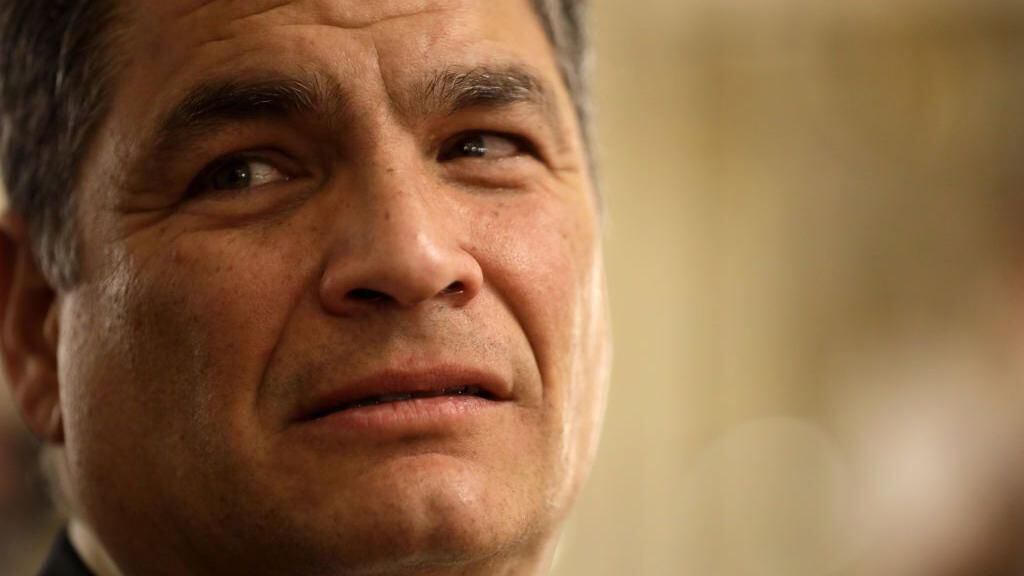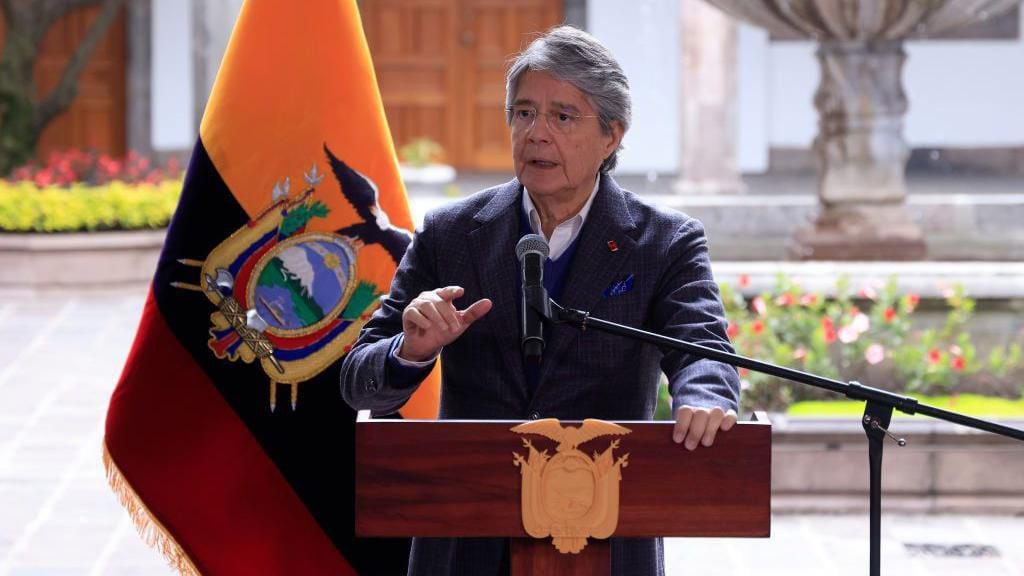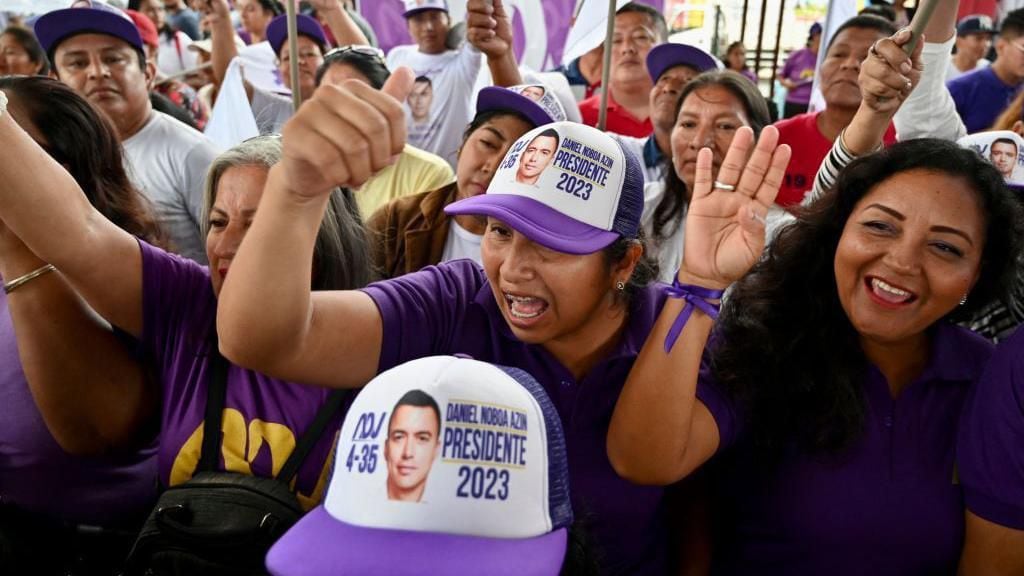After an intense, violent and unprecedented electoral campaign, this Sunday Ecuador will finally elect a new president between Correísta lawyer Luisa González and businessman Daniel Noboa.
Whoever obtains the majority of votes will not govern the country for four years, as traditionally happens, but until May 2025, the date on which the current president should end his term. Guilherme Lasso.
LOOK: What the “Gaza Metro” looks like, the extensive network of secret tunnels built by Hamas and why it is so important in its military strategy
Last May, Lasso called early elections after declaring the “crusader death” for the first time in Ecuador’s history. This appeal led to the dissolution of the National Assembly which, at that time, proposed the removal of the president through impeachment.
Both the first electoral round, on August 20th, and this Sunday’s elections take place in the midst of one of the deeper crises what Ecuador has gone through in its recent history.
The new president will welcome a country ravaged by violence and organized crimewho showed his worst face precisely in this presidential campaign, with the assassination of one of his candidates for office, Fernando Villavicencio, last August.
Based on the latest polls, it is difficult to predict who will win. The experts consulted by BBC Mundo agree that there is a significant degree of uncertainty and volatility which is explained, in part, by the high number of undecided people.
But what factors can tip the scales? And where does each of them stand when faced with this complex choice?
Here we tell you.
Corresismo vs. anticorrelism
Although the situation in the country is unprecedented, in this second round there is a repeating scenario: the confrontation between a Correista candidate versus another who has the support of anti-Correismo.
Rafael Correa, who governed Ecuador between 2007 and 2017, left a legacy in the country that generated loyal followers and detractors.
Luisa González, who obtained 33% of the votes in the first round and could become the first woman elected presidentrepresents the Citizen Revolution, Correa’s party.
Daniel Noboa, who obtained 23% of the votes and could be the youngest Ecuadorian president in history of this country, has the support of the former president’s critics.
Two years ago, the scenario was very similar. Correismo – led by Andrés Araúz, González’s current vice-presidential candidate – won in the first round thanks to the “hard vote” that this group has, but lost the presidency when all anti-Correismo united around Lasso.
“A completely negative image of Correa was created as a figure and I think this could affect Luisa González”, he explains to BBC Mundo. Raúl SalgadoPhD in Political Science and academic at the Latin American Faculty of Social Sciences (Flacso) in Quito.

Salgado recalls that in the elections that gave Lasso the winner, in April 2021, the Discontent with Correismo was decisive.
This time, the phenomenon could help Daniel Noboa, despite having presented itself as an alternative that aspires to overcome the labels of correísmo or anticorreísmo.
At this point it coincides Pablo Ospinahistorian and professor at the Simón Bolívar Andean University.
“In this election, rejection votes and the discomfort that candidates cause among the electorate will be very important. And in this field Daniel Noboa has the advantage because there is a huge rejection of Rafael Correa”, he tells BBC Mundo.
Thus, it is thought that the businessman could attract the votes of Christian Zurita (the candidate who replaced Fernando Villavicencio), who represented the third most voted force in the first round (with 16%) and who was clearly opposed to Correísmo, as well as other minority candidates.
Correísmo electoral machine
But being a Correista also has its advantages.
We must not underestimate the tremendous “political structure” what Correísmo has behind it, he says Franklin Ramirezsociologist and researcher at the Department of Political Studies at Flacso in Ecuador.
And it is that Citizen revolution It has the largest bench in the National Assembly, has several city halls (including Quito and Guayaquil) and 9 prefectures, including Guayas, Pichincha and Azuay.

Luisa González not only has this electoral machine behind her, but also a hard core of voters loyal to the movementwhich was fundamental for its high support in the first round.
“In terms of electoral dynamics, Correa’s figure continues to attract strong votes, which allows any candidate who represents him to obtain, from the beginning, 32 or 33% of support,” Ramírez told BBC Mundo.
“There is a structure of the movement, of the political organization with electoral presence, of a national nature that is very strong. He is not a leader with speeches, he has a very important organization below”, he adds.
It must be taken into account, however, that expanding this support can be a challenge.
And Daniel Noboa?
Noboa, on the other hand, does not have a strong political structure behind it.
Although he is the son of two well-known politicians in Ecuador – Álvaro Noboaone of the richest men in the country and a presidential candidate on several occasions, and Anabella Azindoctor, deputy and legislator of the last Constituent Assembly -, the candidate for the presidency He only has two years of experience as a deputy.
Furthermore, it is supported by a movement called National Alliance for Democratic Action (ADN) which was recently created for this candidacy and which includes groups such as PID (People, Equality and Democracy) and Mover, where former members of Correismo gathered after former president Lenin Moreno’s break with Correa.
“Noboa has nothing like what Luisa González has. He has no mayors, no collaborators. He mentioned possible ministers, all businessmen. But he has no experience in public management”, says Pablo Ospina.
Raúl Salgado states that, eventually, this could become a problem if he manages to triumph this Sunday, as happened with Lasso who competed with Congress for much of his term.
“Not having strong political support has been a serious problem for Lasso. Noboa, without the support of the National Assembly, could be a continuation of this instability,” he indicates.

For Franklin Ramírez, this idea penetrated the electorate.
“He (Noboa) was unable to reverse Lasso’s continuity speech, that idea that he represents an economic group, an elite, that will rely on these same threads and the anti-corruption apparatus but without its own political structure”, he explains.
Although, Noboa denied that he represents the right and guaranteed that his vote is left and center-left.
Furthermore, analysts warn that, for electoral purposes, being identified as a new face and removed from traditional political sectors can also help you.
“In the first shift, the fatigue of the political polarization. She managed to escape this polarization and did not have a belligerent speech. I think that’s his great virtue,” says Ramírez.
On the other hand, Noboa – who comes from a family that grew rich through the agricultural business – managed to position himself as a candidate focused on the country’s struggling economy.
He calls himself the “employment president” and promised that it will attract trade and investment.
And the business community appears to support him.
“Every government must have the ability to convince and bring together certain powers, including the banking and financial sector. And Noboa has them behind it”, says Raúl Salgado.
“This capacity is difficult for Luisa González due to her fiscal policies that are not in the interest of the economic sector”, he adds.
But his years of experience in public administration play in favor of the Correísta candidate, something that Noboa does not have and that Guillermo Lasso did not have either.

Ignorance
There is one point that works against both candidates: their relative ignorance among Ecuadorians.
This is stated by academic Franklin Ramírez.
“Both come from the National Assembly but did not play an important role. Noboa stood out for being ‘son of’, but he was not a well-known leader, and Luisa González was not a notable figure nor did she assume leadership of the bloc,” he comments.
Pablo Ospina, in turn, says that both “are weak from this point of view”.
“What happens is that Luisa González compensates with the structure she has behind her. And we don’t really know about Noboa,” she adds.
The above may explain why presidential debates were especially important in these elections.
In the first, held before the first presidential round, Noboa surprised and, for many, was the big winner to the point that some claimed that this changed the course of the campaign.
While in the subsequent debate, which took place before the presidential second round, it was González who received a better overall rating.
However, experts agree that the biggest challenge for those who triumph in these elections will be to build majorities.
Also give certainty to Ecuadorians in a moment as complex as this.
With that, perhaps, they will be able to be re-elected in 2025.
Source: Elcomercio
I am Jack Morton and I work in 24 News Recorder. I mostly cover world news and I have also authored 24 news recorder. I find this work highly interesting and it allows me to keep up with current events happening around the world.

:quality(75)/cloudfront-us-east-1.images.arcpublishing.com/elcomercio/TVUI57AF3RCKPL73QAUTFWGD6M.jpg)





